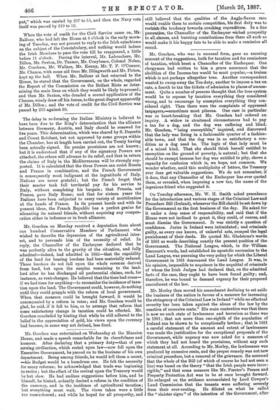Mr. Goschen, who was in unusual form, gave an amusing
account of the suggestions, both for taxation and for remissions of taxation, which beset a Chancellor of the Exchequer. One clergyman had written to him a grave assurance that the abolition of the Income-tax would be most popular,—a truism which is not perhaps altogether true. Another correspondent wanted to sweep away the Tea-duty, another to impose a tax on cats, a fourth to tax the tickets of admission to places of amuse- ment. Quite a number of persons thought that the true system would be to repress by taxation everything they considered wrong, and to encourage by exemption everything they con- sidered right. Then there were the complaints of oppressed taxpayers,—sometimes most piteous. One ease in particular was so heart-breaking that Mr. Goschen had ordered an inquiry. A widow in straitened circumstances had to pay a tax for a dog, and the dog was suffering and blind. Mr. Goschen, " being susceptible," inquired, and discovered that the lady was living, in a fashionable quarter of a fashion- able town, and that the dog was in as satisfactory a con- dition as a dog need be. The logic of that lady must be of a mixed kind. That she should think herself entitled to exemption on the ground of poverty, is natural; but that she should be exempt because her dog was entitled to pity, shows a capacity for confusion which is, we hope, not common. We wonder whether, amid this multiplicity of letters, the Treasury- ever does get valuable suggestions. We do not remember, if it does, that any Chancellor of the Exchequer has ever quoted them, or revealed, when imposing a new tax, the name of the ingenious friend who suggested it.














































 Previous page
Previous page